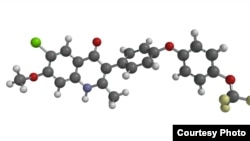ST. LOUIS, MO —
U.S. researchers have developed a new fast-acting drug against malaria that appears to avoid the problem with current medicines, which often lose their effectiveness against increasingly drug-resistant strains of malaria parasites, called Plasmodium.
Scientists say the new malaria medicine may have a decisive edge against this persistent tropical-world killer.
Michael Riscoe of Oregon Health and Science University, in the U.S. Northwest, says the new drug, known as ELQ-300, targets the mitochondria -- energy-producing structures in the parasite’s cells -- and the DNA building blocks they produce.
“So the Plasmodium mitochondrion serves as a factory to make these DNA building blocks, but this is completely blocked by ELQ-300," explains Riscoe. "Studies show that the drug acts very quickly to shut down this process. In fact, (in) only about 10 minutes.”
Perhaps the biggest obstacle in the fight against malaria, Riscoe adds, is the Plasmodium parasite’s ability to mutate and develop resistance to each new drug used against the disease. In tests using laboratory animals, he notes, the parasite did not develop resistant to ELQ-300. “These findings suggest that if the drug is eventually developed for human use, then it could enjoy a long, useful clinical life before resistance emerges in the field.”
That would be good news, because Riscoe says the new drug seems to be much more effective than current anti-malaria medicines. “ELQ-300 is about 30 times more effective at curing malaria in mice as compared to atovaquone, a drug that’s in clinical use today.”
Riscoe and his colleagues cite other advantages to ELQ-300: it may be cheaper to make than existing drugs, and it may be effective at lower doses. They suggest it could be used in combination with another drug to cure malaria with just one dose of medicine.
After successful tests on laboratory mice, ELQ-300 is heading for human trials, starting with tests for safety.
Michael Riscoe was interviewed in a podcast by Science Translational Medicine, the journal which published his research.
Scientists say the new malaria medicine may have a decisive edge against this persistent tropical-world killer.
Michael Riscoe of Oregon Health and Science University, in the U.S. Northwest, says the new drug, known as ELQ-300, targets the mitochondria -- energy-producing structures in the parasite’s cells -- and the DNA building blocks they produce.
“So the Plasmodium mitochondrion serves as a factory to make these DNA building blocks, but this is completely blocked by ELQ-300," explains Riscoe. "Studies show that the drug acts very quickly to shut down this process. In fact, (in) only about 10 minutes.”
Perhaps the biggest obstacle in the fight against malaria, Riscoe adds, is the Plasmodium parasite’s ability to mutate and develop resistance to each new drug used against the disease. In tests using laboratory animals, he notes, the parasite did not develop resistant to ELQ-300. “These findings suggest that if the drug is eventually developed for human use, then it could enjoy a long, useful clinical life before resistance emerges in the field.”
That would be good news, because Riscoe says the new drug seems to be much more effective than current anti-malaria medicines. “ELQ-300 is about 30 times more effective at curing malaria in mice as compared to atovaquone, a drug that’s in clinical use today.”
Riscoe and his colleagues cite other advantages to ELQ-300: it may be cheaper to make than existing drugs, and it may be effective at lower doses. They suggest it could be used in combination with another drug to cure malaria with just one dose of medicine.
After successful tests on laboratory mice, ELQ-300 is heading for human trials, starting with tests for safety.
Michael Riscoe was interviewed in a podcast by Science Translational Medicine, the journal which published his research.




